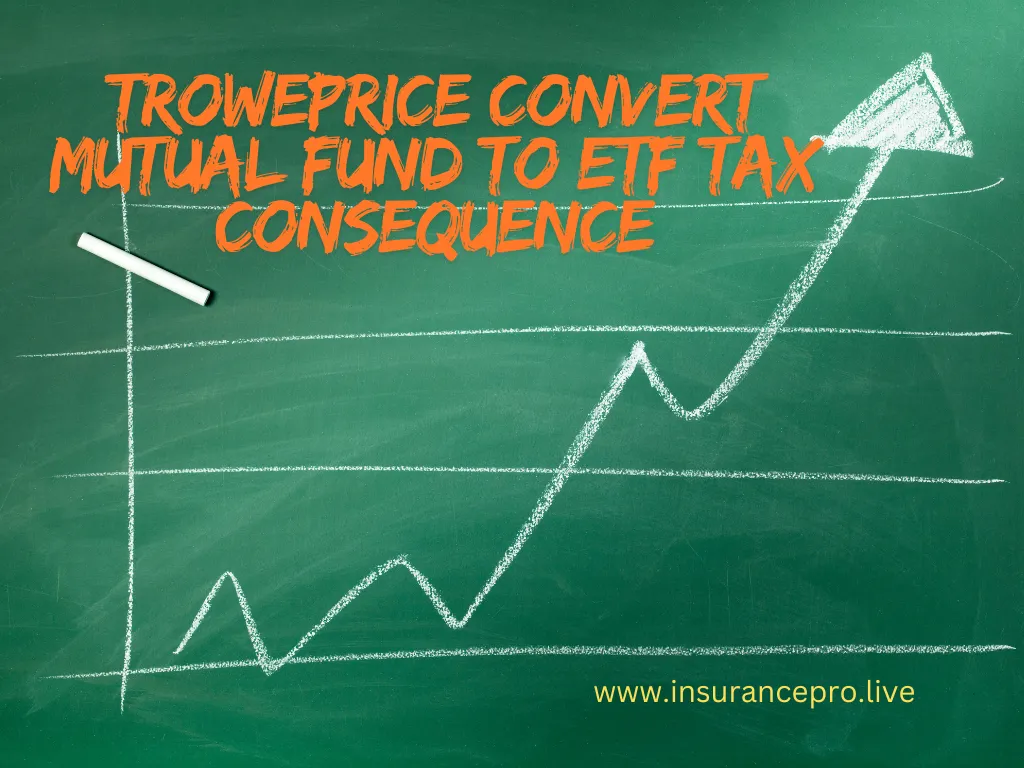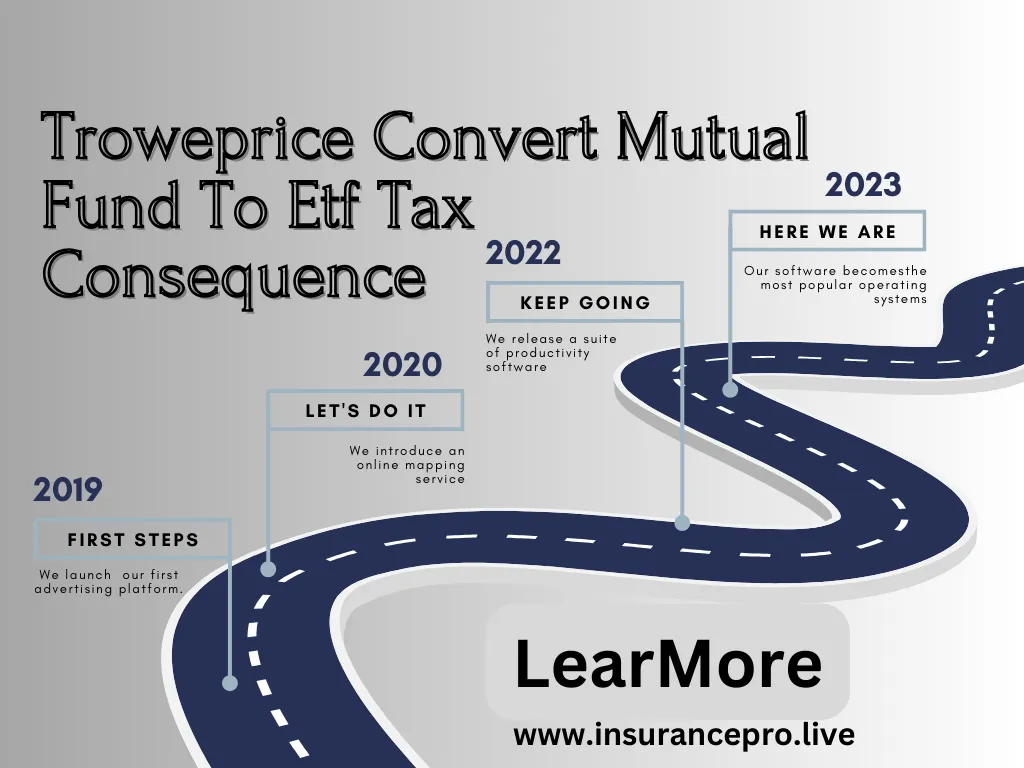Troweprice Convert Mutual Fund To Etf Tax Consequence, a big investment company, is changing some of its **mutual funds** into **ETFs**. This switch might affect your **taxes**. Let’s break down what this means and how it could impact your money.
What are Mutual Funds and ETFs?
Before we dive in, let’s understand what these terms mean:
**Mutual Funds**: These are pools of money from many people, us2ed to buy stocks, bonds, or other investments. A professional manages the fund.
**ETFs** (Exchange-Traded Funds): These are similar to mutual funds but trade like stocks on the stock market. They often have lower fees than mutual funds.
T. Rowe Price’s Big Move
T. Rowe Price decided to turn some of its popular mutual funds into ETFs. This is a big deal because it affects many investors’ money. The company is doing this to offer more choices and possibly lower costs for its customers.
Why Convert Mutual Funds to ETFs?
There are several reasons why T. Rowe Price is making this change:
1. **Lower costs**: ETFs often have lower fees than mutual funds.
2. **More flexible**: Investors can buy and sell ETFs throughout the trading day.
3. **Tax efficient**: ETFs can sometimes be more tax-friendly than mutual funds.
4. **Staying competitive**: Many investors prefer ETFs, so T. Rowe Price wants to offer what people want.
The Conversion Process
When Conclusion Troweprice Convert Mutual Fund To Etf Tax Consequence Price converts a mutual fund to an ETF, here’s what happens:
1. The mutual fund stops accepting new investments.
2. On a set date, the fund turns into an ETF.
3. Investors now own shares of the new ETF instead of the old mutual fund.
This process is designed to be smooth for investors. You don’t have to do anything – your investment automatically changes from a mutual fund to an ETF.
Tax Consequences: The Big Question
Now, let’s talk about the most important part – how this change might affect your taxes. The good news is that for most people, there won’t be any immediate tax bill when the conversion happens.
Here’s why:
1. **No sale**: The conversion isn’t considered a sale for tax purposes. This means you don’t have to report any gains or losses on your tax return just because of the switch.
2. **Same cost basis**: Your cost basis (the price you paid for your shares) stays the same in the new ETF.
3. **Holding period continues**: The time you’ve held your investment doesn’t reset. This is important for long-term capital gains tax rates.

However, there are some tax-related things to keep in mind:
1. **Future sales**: When you eventually sell your ETF shares, you’ll need to calculate your gain or loss based on your original purchase price in the mutual fund.
2. **Different tax treatment**: ETFs and mutual funds have some differences in how they’re taxed. ETFs might have fewer capital gains distributions, which could be good for your taxes in the long run.
3. **Last distribution**: The mutual fund might make a final distribution before converting. This could be taxable, but it’s not because of the conversion itself.
When we talk about taxes on investments, we often mention **capital gains**. This is the profit you make when you sell an investment for more than you paid for it. There are two types:
1. **Short-term capital gains**: These apply if you held the investment for one year or less. They’re taxed at your regular income tax rate.
2. **Long-term capital gains**: These apply if you hold the investment for more than one year. They’re usually taxed at a lower rate than short-term gains.
The conversion from a mutual fund to an ETF doesn’t count as a sale, so it doesn’t trigger capital gains taxes by itself.
Potential Benefits of the Conversion
While the conversion might seem confusing, it could have some benefits:
1. **Lower expenses**: ETFs often have lower ongoing costs than mutual funds.
2. **Tax efficiency**: ETFs might generate fewer taxable events over time.
3. **More trading flexibility**: You can buy or sell ETF shares throughout the trading day.
4. **Transparency**: ETFs usually disclose their holdings daily, so you know what you own.
What Should You Do?
If you own a Conclusion Troweprice Convert Mutual Fund To Etf Tax Consequence Price mutual fund that’s converting to an ETF, here are some steps to consider:
1. **Stay informed**: Read all the information T. Rowe Price sends you about the conversion.
2. **Check your cost basis**: Make sure your records of what you paid for your mutual fund shares are correct.
3. **Talk to a tax professional**: If you’re worried about tax implications, consider getting advice from a tax expert.
4. **Think long-term**: Remember, the conversion itself shouldn’t cause a tax bill. Think about how the ETF fits into your long-term investment plans.
5. **Learn about ETFs**: If you’re new to ETFs, take some time to understand how they work and how they’re different from mutual funds.
Possible Drawbacks to Consider
While the conversion has many potential benefits, there are some things to watch out for:
1. **Trading costs**: If you buy and sell ETF shares often, you might pay more in trading fees than you did with the mutual fund.
2. **Bid-ask spreads**: ETFs have a bid price (what buyers will pay) and an asking price (what sellers want). This spread is a hidden cost you didn’t have with mutual funds.
3. **Change in investment style**: The new ETF might be managed slightly differently than the old mutual fund.
4. **Learning curve**: If you’re used to mutual funds, you’ll need to learn how ETFs work.

The Bigger Picture: Industry Trends
Conclusion Troweprice Convert Mutual Fund To Etf Tax Consequence Price isn’t the only company converting mutual funds to ETFs. This is part of a bigger trend in the investment world. More and more investors are choosing ETFs because they often have lower fees and can be more tax-efficient.
This trend shows how the investment industry is changing to meet investor demands. Companies like Conclusion Troweprice Convert Mutual Fund To Etf Tax Consequence Price are adapting to stay competitive and offer products that people want.
How This Affects Different Types of Accounts
The tax consequences of the conversion can be different depending on what type of account holds your investment:
1. **Taxable accounts**: These are most affected by the tax considerations we’ve discussed.
2. **Tax-deferred accounts** (like traditional IRAs or 401(k)s): The conversion shouldn’t have any immediate tax impact because these accounts are already tax-deferred.
3. **Tax-free accounts** (like Roth IRAs): Again, there shouldn’t be any tax impact because these accounts are already tax-free for qualified distributions.
While the conversion itself might not cause a tax bill, it’s important to think about future taxes:
1. **Capital gains**: When you eventually sell your ETF shares, you’ll owe taxes on any gains.
2. **Dividends**: If the ETF pays dividends, these are usually taxable in the year you receive them.
3. **Tax-loss harvesting**: ETFs can make it easier to do tax-loss harvesting, which is a strategy to reduce your tax bill by selling lost investments.
With any investment change, it’s crucial to keep good records. Make sure you:
1. Save all statements from before and after the conversion.
2. Keep track of any reinvested dividends or capital gains distributions.
3. Note the date of the conversion and the share price on that date.
These records will be important when you eventually sell your ETF shares and need to calculate your capital gains.

The Role of Cost Basis
**Cost basis** is a key concept in understanding the tax implications of this conversion. It’s the amount you paid for your investment, including any fees or commissions.
When the mutual fund converts to an ETF, your cost basis carries over. This means:
1. You don’t “reset” your purchase price to the value on the conversion date.
2. When you sell, your gain or loss is still based on your original purchase price in the mutual fund.
Understanding this can help you make smart decisions about when to sell in the future.
Conclusion Troweprice Convert Mutual Fund To Etf Tax Consequence
The conversion of Conclusion Troweprice Convert Mutual Fund To Etf Tax Consequence Price mutual funds to ETFs is a big change, but for most investors, it shouldn’t cause immediate tax headaches. The key points to remember are:
1. The conversion itself isn’t a taxable event for most investors.
2. Your cost basis and holding period carry over to the new ETF.
3. There may be long-term tax benefits from owning ETFs instead of mutual funds.
4. It’s important to keep good records and understand how ETFs work.
While taxes are important, they shouldn’t be the only factor in your investment decisions. Consider how the new ETF fits into your overall financial plan. If you’re unsure about anything, don’t hesitate to ask questions or seek advice from a financial professional.
Remember, investing is a long-term game. This change by Conclusion Troweprice Convert Mutual Fund To Etf Tax Consequence Price is designed to give you more options and potentially lower costs. By understanding the tax implications and how ETFs work, you can make the most of this change in your investment journey.






